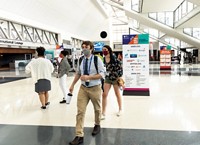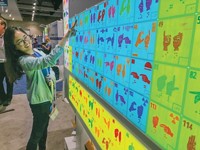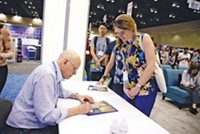Advertisement
Grab your lab coat. Let's get started
Welcome!
Welcome!
Create an account below to get 6 C&EN articles per month, receive newsletters and more - all free.
It seems this is your first time logging in online. Please enter the following information to continue.
As an ACS member you automatically get access to this site. All we need is few more details to create your reading experience.
Not you? Sign in with a different account.
Not you? Sign in with a different account.
ERROR 1
ERROR 1
ERROR 2
ERROR 2
ERROR 2
ERROR 2
ERROR 2
Password and Confirm password must match.
If you have an ACS member number, please enter it here so we can link this account to your membership. (optional)
ERROR 2
ACS values your privacy. By submitting your information, you are gaining access to C&EN and subscribing to our weekly newsletter. We use the information you provide to make your reading experience better, and we will never sell your data to third party members.
ACS Meeting News
Chicago hosts ACS Fall 2022 meeting
Meeting highlights included programming on sustainability and diversity, equity, inclusion, and respect
by Bibiana Campos Seijo
August 25, 2022
| A version of this story appeared in
Volume 100, Issue 30

The American Chemical Society held its fall 2022 meeting in Chicago Aug. 21–25. As of Aug. 24, 11,619 scientists had registered; 2,264 attended virtually, and 9,355 opted to travel to the Windy City. The meeting attracted 9,963 abstract submissions, including 2,886 poster presentations, on the theme “Sustainability in a Changing World.”
The opening keynote session featured talks by Jennifer Wilcox from the US Department of Energy’s Office of Fossil Energy and Carbon Management on the role of carbon capture in meeting net-zero carbon goals, William Dichtel from Northwestern University on his work on polyurethane reprocessing and developing polymers to remove trace organic pollutants from water, and Laura L. McConnell from Bayer Crop Science on the role of partnerships in scientific research. Dichtel, McConnell, and Wilcox also participated in a Q&A moderated by Sherine O. Obare, a member of ACS’s Committee on Environmental Improvement and a professor at the University of North Carolina at Greensboro.
Ellen Matson of the University of Rochester presented the Kavli Foundation Emerging Leader in Chemistry Lecture, titled “Atomic Insights for a Sustainable Future: Understanding Bonding at Metal Oxide Surfaces Relevant to Energy Storage and Conversion Processes.”
Laura Gagliardi of the University of Chicago delivered the Fred Kavli Innovations in Chemistry Lecture, titled “Quantum Leaps: Chemistry and Creativity in a Changing World.”
During the ACS Board of Directors regular meeting, ACS Board of Directors chair Paul Jagodzinski interviewed Hannibal B. Johnson about diversifying leadership. Johnson is an author, attorney, and consultant on diversity, equity, and inclusion and nonprofit governance and leadership.
Events at the meeting sponsored by ACS president Angela Wilson included receptions in honor of the American Indian Science and Engineering Society’s 45th anniversary and the 20th of ACS’s LGBTQ+ committee, a symposium in memory of Robert H. Grubbs, a Zumba session, and a presentation and Q&A with German quantum chemist Joachim Sauer. During “From the Shadow of the Berlin Wall to the Spotlight of International Politics,” Sauer shared insight into the German scientific community before and after the fall of the Berlin Wall and his experiences as partner of former chancellor Angela Merkel.
In addition, attendees could participate in Sci-Mix, the ChemLuminary Awards and ACS fellows ceremonies, and ACS’s Kids Zone, which provided families the opportunity to learn through hands-on science activities, such as making ultraviolet light detectors and building a solar cell at Chicago’s Navy Pier.
The ACS Committee on Budget and Finance reported that as of June 30, 2022, ACS’s total revenues were 8.7% above budget, at $352.5 million. Year-to-date total expenses were $308.2 million, and net contribution from operations was $44.4 million.
The ACS Council held its first-ever hybrid meeting and voted to approve amendments to the application-and-dues process for the Committee on Corporation Associates, to continue the Committee on Public Relations and Communications, and to change the name of the Northeast Tennessee Local Section to Tennessee–Virginia Highlands Local Section. It also voted to approve amendments to standing rules on elections function and to provide the Committee on Divisional Activities greater authority to assist divisions that have inactive Executive Committees.
In his last report to the council before his upcoming retirement, ACS’s CEO, Thomas Connelly, provided updates on a number of activities, including ACS’s strategic initiatives. For those initiatives, the society has committed to invest up to $50 million over 5 years for sustainability, fostering a skilled technical workforce, accelerating digital research data projects, and accelerating life sciences growth.
Recorded sessions from ACS Fall 2022 will be available on demand Aug. 26–Sept. 9 through www.acs.org.





Join the conversation
Contact the reporter
Submit a Letter to the Editor for publication
Engage with us on Twitter